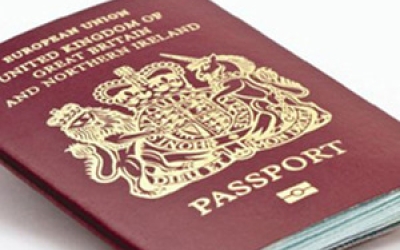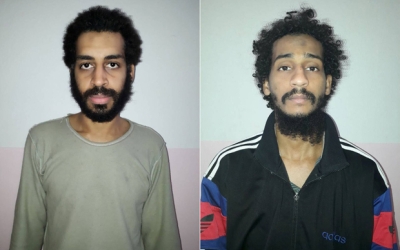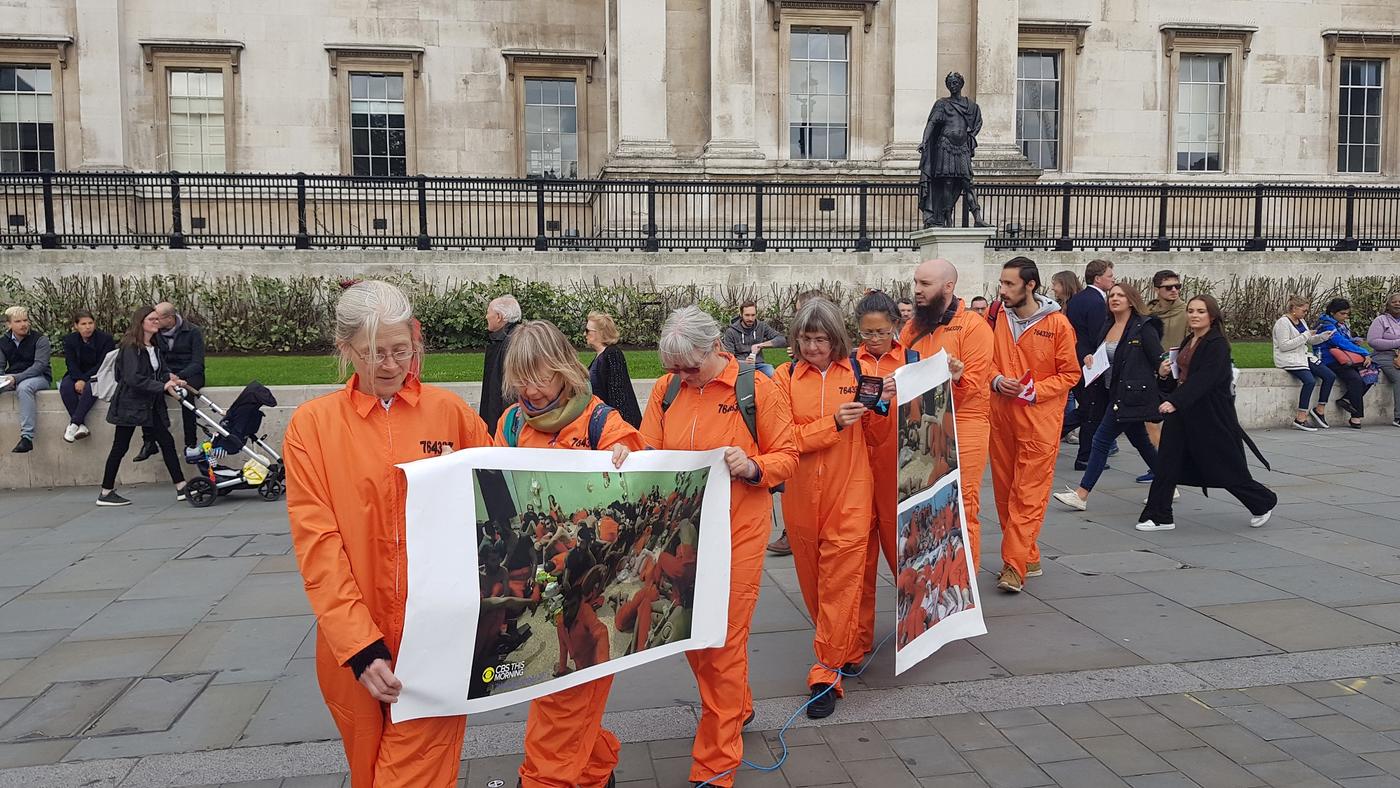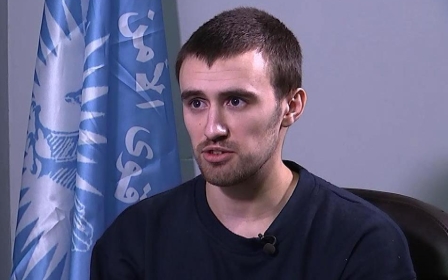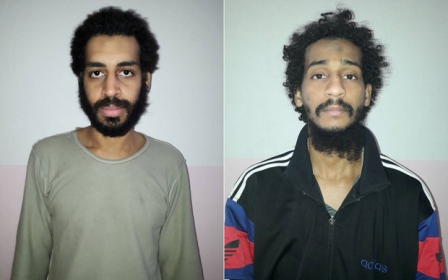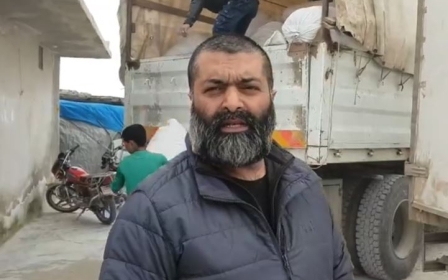'That's my son being tortured': Jack Letts' parents say UK must bring IS suspects home
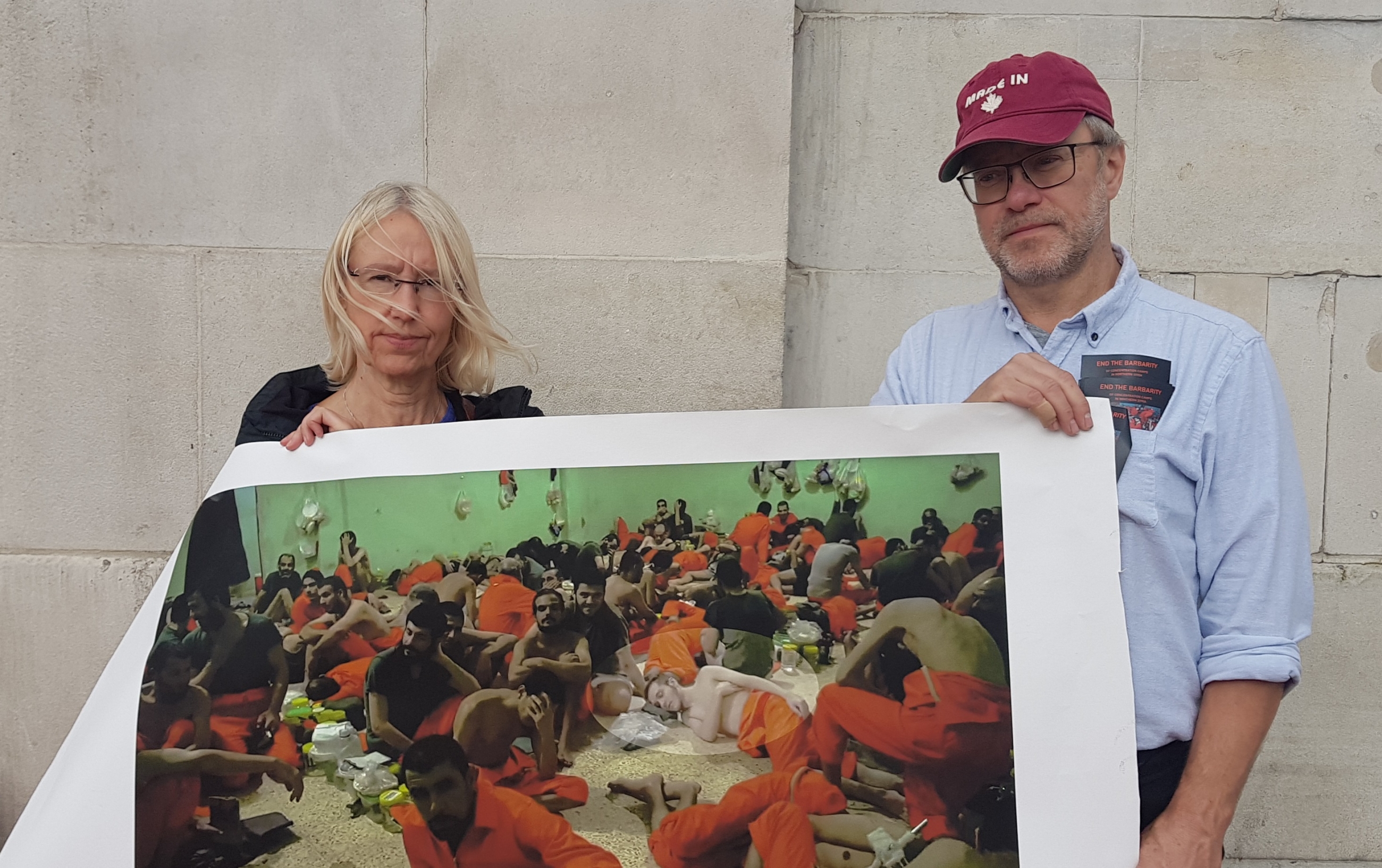
Against a backdrop of London’s Extinction Rebellion protests, the parents of a young British man held among thousands of suspected Islamic State fighters in Kurdish-controlled northeastern Syria on Thursday called on the government to bring him home.
"That's my son in the photo being tortured," says John Letts, as he presses flyers into the hands of onlookers outside the National Gallery on Trafalgar Square, a row of bodies on the ground in fancy dress shop orange prison suits distracting them from the competing clamour of beat boxers and street dancers on one side and a busker singing "The Sound of Silence" on the other.
Letts’ son is Jack Letts, a 24-year-old Muslim convert from Oxfordshire who travelled to Syria in 2014, ending up in territory under the control of the Islamic State (IS) group and eventually being captured and imprisoned by Kurdish fighters in May 2017.
The photo is a still from a video showing detainees crammed into an overcrowded cell inside an unidentified prison in northeastern Syria, where Letts’ parents believe he is currently being held.
New MEE newsletter: Jerusalem Dispatch
Sign up to get the latest insights and analysis on Israel-Palestine, alongside Turkey Unpacked and other MEE newsletters
They say the gaunt and shaven-headed figure lying on the ground between other similarly emaciated prisoners on the posters and flyers they have printed is their son.
'Reminiscent of concentration camps'
The video was originally broadcast by CBS News in the US last month, while Anthony Loyd, the Times' war correspondent who also gained access to the prison, described conditions there as a “time bomb” and “more reminiscent of concentration camps than suggestive of justice”.
“That’s his mother. She’s a terrorist as well,” says another orange-clad protester, handing a flyer to a curious passer-by and referring to the terrorism conviction for sending £223 ($276) to their son for which Sally Lane, Jack Letts' mother, and John Letts received suspended 18-month prison sentences earlier this year.
While others today are dressed in orange and lying on the ground, Lane and her husband are not participating directly themselves for fear of attracting needless police attention.
“We can’t afford to get arrested,” says Lane. “We have a prison sentence hanging over us.”
Lane says she hopes that the shocking images of the prison will give renewed momentum to the campaign to pressure the British government to take responsibility for her son and other British nationals being held in Syrian camps with no access at present to legal due process or hope of a trial.
But, like other British dual nationals in Syria, Jack Letts, who also has Canadian nationality through his father, has already been stripped of his citizenship.
Lane said the government had long refused to offer any help with his repatriation on the grounds that it currently had no consular services in Syria.
The UK and citizenship-stripping powers
+ Show - HideThe UK has been described by researchers as a “global leader in using citizenship deprivation as a counterterrorism measure”.
Historic citizenship-stripping powers targeted at naturalised citizens on disloyalty grounds had largely fallen into disuse prior to 2002, when the government introduced new measures in an attempt to revoke the citizenship of Abu Hamza, an Egyptian-born cleric subsequently convicted of terrorism in the US.
The 2002 legislation allowed for British-born nationals as well as naturalised citizens to lose their nationality rights. Successive governments gradually broadened the scope of the powers so that home secretaries can now deprive anyone of citizenship if they are satisfied that doing so is “conducive to the public good” and would not leave an individual stateless.
No criminal conviction is required. Letters often state that individuals have been assessed as presenting “a risk to the national security of the United Kingdom”.
The government’s use of the powers surged to unprecedented levels in response to the perceived threat posed by British nationals returning from Syria.
Between 2010 and 2015, 33 people were stripped of their citizenship, according to Home Office figures. In 2016, 14 people were deprived, and in 2017 the number jumped to 104.
In 2018, the figure was 21, and in in 2019 - when Shamima Begum was among those targeted - it was 27. It then dropped to ten in 2020 and eight in 2021.
Some subjects of citizenship-stripping orders argue that they have been left effectively stateless, because the government bases its assessment that they are dual nationals on a right of citizenship to a parent’s country of birth, even if they have never taken up that citizenship or even visited the country.
In some cases the Special Immigration Appeals Commission, which rules on citizenship cases, has agreed: it has ruled in favour of British nationals of Bangladeshi descent on the grounds that Bangladesh does not consider them citizens if they have not claimed Bangladeshi nationality before the age of 21.
Human rights organisations and lawyers have compared the powers to “medieval exile and banishment”. Critics also point out that the powers create a two-tier system in which only those deemed to be dual nationals are at risk of losing their British citizenship; a measure that discriminates against naturalised citizens, immigrants and their children.
“The good thing about the [Times] article is that for the first time it gave an understanding of the reality of the situation. This is not just one big mass of evil people. There are 12-year-old children there. There are refugees who were fleeing ISIS. It’s a dragnet,” she told Middle East Eye.
“We’ve been screaming about this for two-and-a-half years, but one photo counts for more than two-and-a-half years of screaming."
Turkish assault
Letts’ parents are worried too what Turkey’s assault against Kurdish forces, launched on Wednesday, means for those being held in camps and prisons in the region.
On Thursday, the US announced that it had moved 40 individuals considered to be high-profile IS captives into its custody, including two men, El Shafee Elsheikh and Alexanda Kotey, suspected of being members of a notorious British execution cell dubbed “the Beatles”.
In a statement issued through her lawyers on Thursday, Maha Elgizouli, the mother of Elsheikh, said she was "bitterly disappointed" that her efforts to have her son brought back to the UK to face trial had not succeeded.
Elgizouli is currently awaiting the verdict of a Supreme Court case she brought against the UK government to challenge its decision to provide material to the US about her son without seeking assurances that he would not face the death penalty if convicted.
"She is surprised and bitterly disappointed that her efforts for more than one-and-a-half years to establish that he could and should be tried in the UK have to date not succeeded," the statement, released by Birnberg Peirce Solicitors, said.
"She has recognised at all times that her son should face justice but has argued that this should be in this country.
Lane said that the government’s inaction in regard to British nationals, and their apparent willingness to see them remain in Kurdish custody, had become a crisis with Turkey's attack.
"The problem which was contained is now going to be infinitely worse,” she said.
“We are worried about Jack in all of this. Whether he is going to be caught in the crossfire, whether he is going to be shelled, whether he is going to be forced to fight, or whether he is going to be killed by IS members. He is at risk from several different areas.”
In an interview with the BBC last year, Letts said he had once considered himself an "enemy of Britain" but had made a "big mistake" and had later sought to escape from IS.
"I regretted what I did. The British idea supposedly is that even if you make big mistakes you can go back from your mistakes.... you can set things right."
'A rather naive and gauche young man'
Letts’ parents were joined in their protest by several orange-clad family friends as well as activists supportive of their cause, though most were several decades older than the mass of younger protesters filling the rest of the square to call for action to tackle the climate crisis.
“I felt the urge to stand up for someone who finds themself in a tight spot that has been made worse by government action,” said Noel Hamel, a 77-year-old retired joiner from New Malden in south London, who said he had long campaigned for the rights of prisoners being held without trial at Guantanamo Bay.
“He is a rather naive and gauche young man who went out there to try and support the Syrian people against Assad’s brutality and he has been scooped up as a potential Islamic terrorist.”
Cerie Bullivant, a spokesperson for Cage, an advocacy organisation which campaigns to highlight civil liberties issues raised by counter-terrorism policies, said that the precarious situation in Syria required immediate action from the government to repatriate British nationals.
“The UK has an arsenal of laws to prosecute those accused of wrongdoing overseas. However, abandoning people in indefinite detention, in deplorable conditions, and weaponising the secretive citizenship deprivation process to absolve ourselves of all responsibility towards a conflict in which our country has been complicit is counterproductive.”
After their demonstration in Trafalgar Square, the protesters made their way slowly to the adjacent Canadian embassy, those in orange with their legs bound together with rope to mimic prisoners’ shackles.
'I thought Canada was an independent country'
“I’m disappointed in my country. I thought Canada was an independent country. We are just doing what America and the UK tells us to do,” said John Letts, telling MEE that he believes Canada was preparing to repatriate Jack Letts until the British intervened to halt the process.
Ingrid Widdows, a 65-year-old educational consultant from Oxford whose son went to school with Jack Letts, told MEE she had been moved to protest out of “horror, disgust and rage” at the British government’s failure to access and repatriate its own nationals being held in Syria.
“The article in the Times showing the conditions these prisoners are in takes us below any level of human rights or humanity. We are behaving like ISIS themselves. We believe that Jack is innocent but there are no trials, there is no justice.”
Mary Ellis, a 61-year-old therapist from Woking and a friend of the Letts family, also raised the case of Shamima Begum, a British woman from London who travelled to IS-controlled Syria as a 15-year-old and who is now also stuck in a camp and deprived of British citizenship.
“We have laws and due processes and they have not been adhered to. Shamima Begum went out as a child and undoubtedly is suffering from trauma. She needs to be brought back to justice and to trauma treatment,” said Ellis.
“They were radicalised here and the government is not taking responsibility. We have a mature judicial system and an ethical responsibility to take responsibility for that.”
Middle East Eye delivers independent and unrivalled coverage and analysis of the Middle East, North Africa and beyond. To learn more about republishing this content and the associated fees, please fill out this form. More about MEE can be found here.


